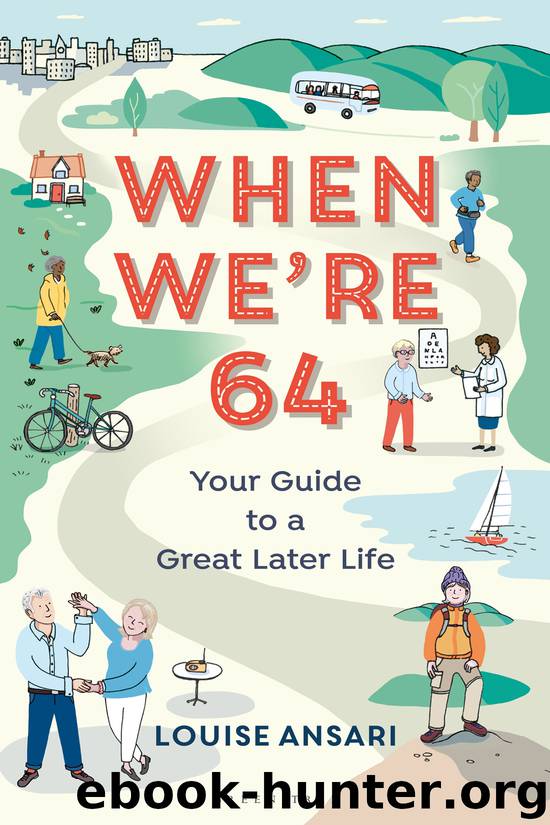When We're 64 by Louise Ansari

Author:Louise Ansari
Language: eng
Format: epub
ISBN: 9781472960696
Publisher: Bloomsbury Publishing
Of course, learning a language isn’t the only activity that can help with brain health. One study compared the cognitive health of two groups of people, one that spent time every week doing non-demanding tasks, such as watching a film or socialising, and the other learning digital photography or quilting. Unsurprisingly, the group learning a new skill had better cognitive ability.
Dr Bak speaks seven languages – impressive. He said that while lots of practice – up to five hours a week – shows an amazing improvement on brain health, similarly to physical activity, even small amounts help. So perhaps now’s the time to dust off those language learning CDs (or borrow some from the library), join a local conversation group, or start a course in Spanish, Japanese or Swahili!
Mental health
Having good mental health is just as important as avoiding or managing physical disease, and we’ve seen a welcome movement to talk and understand more about mental health over the last few years, as well as prevent poor mental health where possible and treat it on a par with physical health. But the extent of poor mental health in older people is shockingly high and feels hidden in wider society.
• Twenty-two per cent of men and 28 per cent of women over 65 are thought to suffer from clinical depression. But only 25 per cent of these receive treatment for their conditions.
• It’s estimated that up to 40 per cent of older adults in full-time care suffer from depressive disorders, and these often go unnoticed.
• Some of the most common triggers for depression include retirement, bereavement, being on your own and disability. These factors often affect people as they age and dealing with them can be difficult.
Have you seen any of these symptoms in someone you know?
• Turning down invitations or social events that they’d usually enjoy.
• Not seeming to get much happiness out of visits.
• Neglecting their appearance or personal hygiene.
• Complaining of feeling worthless.
Nearly 8 million people over 55 experience depression, and 7 million have anxiety. But don’t despair. There is support for you, or someone you care about, to help improve mental health. Try and speak to a healthcare professional. Your GP can advise on your condition and talking your fears through may help. If you just want to learn more, you can visit the government’s website dedicated to helping improve older adults’ mental health, MindEd.
Eyes, ears, feet and other bits
As well as long-term conditions like COPD, and serious ‘events’ like cancer and stroke, there are some common problems faced by older adults (and many people in ‘middle age’). If they begin to affect ageing relatives, or yourself, there are ways to manage and get help.
Download
This site does not store any files on its server. We only index and link to content provided by other sites. Please contact the content providers to delete copyright contents if any and email us, we'll remove relevant links or contents immediately.
| Budgeting & Money Management | College & Education Costs |
| Credit Ratings & Repair | Retirement Planning |
The Compound Effect by Darren Hardy(8972)
Tools of Titans by Timothy Ferriss(8400)
Nudge - Improving Decisions about Health, Wealth, and Happiness by Thaler Sunstein(7710)
Win Bigly by Scott Adams(7201)
Deep Work by Cal Newport(7089)
Rich Dad Poor Dad by Robert T. Kiyosaki(6640)
Principles: Life and Work by Ray Dalio(6455)
Pioneering Portfolio Management by David F. Swensen(6303)
Digital Minimalism by Cal Newport;(5765)
The Barefoot Investor by Scott Pape(5748)
Grit by Angela Duckworth(5616)
The Slight Edge by Jeff Olson(5420)
Discipline Equals Freedom by Jocko Willink(5391)
The Motivation Myth by Jeff Haden(5214)
You Are a Badass at Making Money by Jen Sincero(4931)
The Four Tendencies by Gretchen Rubin(4606)
Eat That Frog! by Brian Tracy(4543)
The Confidence Code by Katty Kay(4265)
Bullshit Jobs by David Graeber(4194)
